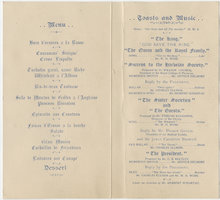Search the Special Collections and Archives Portal
Search Results
Hecht, Chic, 1928-2006
Nevada businessman and Republican politician Jacob "Chic" Hecht (1928-2006) was elected to the U.S. Senate in November 1982. As a senator, he used quiet diplomacy skills to help Soviet Jews gain permission to emigrate. During the Korean War, Hecht served as a counterintelligence agent in Berlin. After the war he moved to Las Vegas, Nevada and operated several businesses. Hecht also represented Clark County in the Nevada State Senate for eight years.
Person
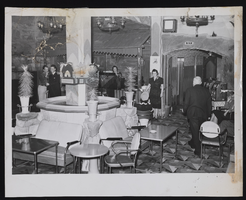
Photograph of the Horseshoes Hotel and Casino interior, Las Vegas (Nev.), 1940-1959
Date
Archival Collection
Description
An interior view of the Horseshoe Hotel & Casino. Guests and staff sit and stand around the room. There are slot machines near the bar entrance and a man appears to be singing to the left. The stamp on back of photo says, "Vegas Studio & Camera Supply 116 Fremont Street Las Vegas, Nevada."
Image
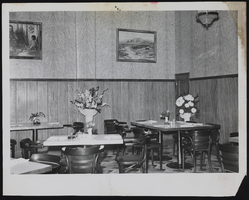
Photograph of table settings inside a Horseshoe Casino restaurant, Las Vegas (Nev.), 1940-1959
Date
Archival Collection
Description
A photograph of a coffee shop or restaurant inside the Horseshoe Club Casino. The tables are set with napkins and silverware, salt, pepper, and what looks like a sugar bowl. Paintings hang from the walls. The stamp on back of photo says, "Vegas Studio & Camera Supply 116 Fremont Street Las Vegas, Nevada."
Image

Photograph of $1 million dollars displayed inside the Binion's Horseshoe, Las Vegas, Nevada, approximately 1960 to 1979
Date
Archival Collection
Description
Million dollar cash display at Binion's Horseshoe, Las Vegas. One hundred $10,000 bills are encased in bullet-proof glass and hang inside an 8 foot, 2,000 pound golden horseshow. Visitors could have their photograph taken in front of the display. (c. 1960s-70s). Stamp on back of photo: "Las Vegas News Bureau Las Vegas, Nevada Convention Center".
Image

Photograph of Chill Wills and another man in front of the Binion's Horseshoe, Las Vegas, Nevada, approximately 1940 to 1985
Date
Archival Collection
Description
Chill Wills (left) standing with an unidentified man in front of the Million Dollar Horseshoe at Binion's Horseshoe Casino.
Image
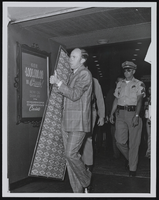
Photograph of Jack Binion transporting money inside the Horseshoe Casino, Las Vegas, Nevada, 1971
Date
Archival Collection
Description
Jack Binion of Binion's Horseshoe Casino is followed by security guards as he carries the $1,000,000 display through the casino. (c. 1971). Stamp on back of photo: "Las Vegas News Bureau Las Vegas, Nevada Convention Center 22333".
Image
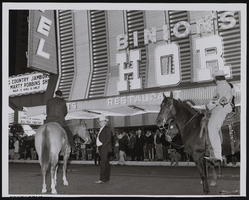
Photograph of horses outside of the Horseshoe Casino, Las Vegas (Nev.), April 17, 1968
Date
Archival Collection
Description
Benny Binion (standing, center) at a quarter horse sale in front of his Horseshoe Casino. (April 17, 1968). Stamp on back of photo: "Allen Photographers. Inc. Post Office Box 4253 Las Vegas, Nevada 89106". Number stamp on back of photo: "8832". Date stamped on back of photo: "April 17, 1968".
Image
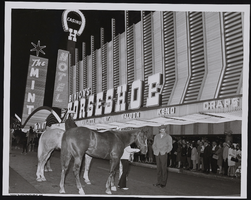
Photograph of horses and a crowd outside of the Horseshoe Casino, Las Vegas (Nev.), April 17, 1968
Date
Archival Collection
Description
Unidentified people stand with horses on the street outside of the Horseshoe Casino on April 17, 1968 while spectators on the sidewalk watch. Inscription with the image reads: "Quarter horse sale, Fremont Street." The stamp on back of photo says, "Allen Photographers. Inc. Post Office box 4253 Las Vegas, Nevada 89106." For other images of the same event, see pho026119 & pho026120.
Image
UNLV Libraries Collection of American Advertising Federation ADDY Award Submissions
Identifier
Abstract
The UNLV Libraries Collection of American Advertising Federation: ADDY Award Submissions Collection is compromised of Las Vegas, Nevada ADDY award submissions dating from approximately 1980 to 1999. The collection contains submissions by many artists to the ADDYS competition.
Archival Collection

